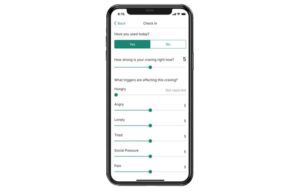 A wide range of companies are aiming to make waves through digital therapeutic offerings and each is doing things differently.
A wide range of companies are aiming to make waves through digital therapeutic offerings and each is doing things differently.
“We are seeing tremendous momentum for the DTx industry, with more and more products coming to market and gaining commercial coverage and recent signals from the White House and Congress demonstrating their interest and recognition of DTx products as an important way to expand access to quality treatments for populations with public coverage, especially underserved communities,” Digital Therapeutics Alliance CEO Andy Molnar told Medical Design & Outsourcing. “While we are riding a massive swell, the wave hasn’t even begun to crest. The community is expanding and convening this broad coalition of stakeholders is critical to really scale the industry and drive DTx adoption and integration to truly transform healthcare.”
Read: How DeepWell is developing video games as tools for treating medical conditions
Pear Therapeutics has been at the forefront of the effort with its three FDA-authorized prescription digital therapeutics (PDTs) for treating substance-use disorder, opioid use disorder and chronic insomnia.
The Boston-based company went public through a special purpose acquisition company (SPAC) merger at the end of 2021, shortly after its fourth PDT platform received FDA breakthrough device designation for alcohol-use disorder.
Pear has continued to push forward, garnering new Medicare coding for its PDTs, expanding to Japan and other new geographies, and launching a platform to offer PDTs through telehealth platforms, among other steps.
Another PDT developer is Better Therapeutics, with offerings designed to deliver a novel form of cognitive-behavioral therapy for treating cardiometabolic diseases.
The San Francisco-based company completed enrollment in a trial for its type 2 diabetes-treating PDT at the end of last year. Like Pear, Better Therapeutics also went public through a SPAC merger. In April 2022, the company reported positive outcomes for three studies. The research included the first study of nutritional cognitive behavioral therapy (nCBT) as a potential treatment for nonalcoholic fatty liver disease (NAFLD) and nonalcoholic steatohepatitis (NASH).
Yet another firm, DarioHealth, made big moves in March when it announced a $30 million partnership with pharmaceutical giant Sanofi. The companies said the deal will accelerate the commercial adoption of New York-based Dario’s suite of digital therapeutics and expand digital health solutions on the Dario platform.
Dario said its AI-powered digital therapeutic platform “provides adaptive, personalized experiences that drive behavior change through evidence-based interventions, intuitive, clinically proven digital tools, high-quality software, and coaching to help individuals improve health and sustain meaningful outcomes.”
DarioHealth and Sanofi said they will collaborate on new or enhanced solutions to be offered through the Dario platform.
“Our collaboration with Dario is another step towards accelerating Sanofi’s mission of reversing the course of chronic diseases through the integration of healthcare and technology in a way that gives people the tools to improve their health,” Sanofi Head of U.S. General Medicines Gustavo Pesquin said in a news release. “We are excited to help payers realize the potential digital health can bring to the patient experience, and we look forward to continuing to innovate with Dario on the next generation of chronic condition therapies.”